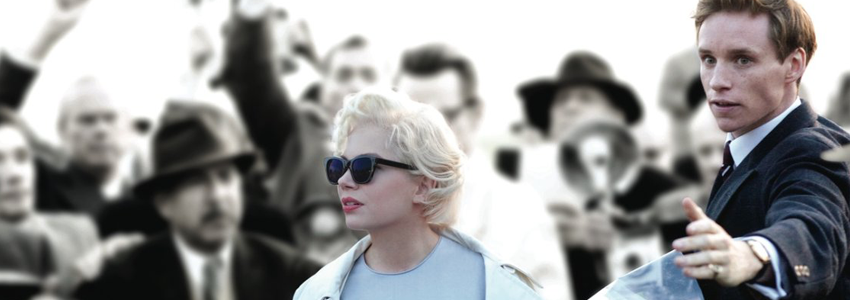My Week With Marilyn

Conrad speaks on "My Week With Marilyn"...
I've worked on projects where I've been sent the script before it's even been shot, which can be helpful when understanding what the story's about but really since film music to me is dictated by the tone of the film, how it's shot, how it's acted, the pacing of the film, it's really much better to start with the music once you've seen the film because the pacing of the film is going to determine what kind of music you're talking about. Even how the characters are shot, and what kind of lighting, will all determine what kind of music as well.
On this particular film, they'd already shot it, and I got to see a cut of it. It wasn't the final cut that we now have of the film, but it was a kind of first draft, if you will. And Harvey Weinstein, the producer of the film, had very definite ideas of what he thought worked and what didn't work. We had a temp track in there, which is temporary music that's supposed to give the idea of what the music should be. So we started by just looking and talking about how the temp track seemed right or seemed wrong, right tone, wrong tone. We tried some Frank Sinatra songs that I thought were not right, actually, for the film. And so you first do that, and then you come to an agreement about where you're going to put the music. The various scenes, and you sort of go "this character's gonna have this theme, and that one will have that theme" and you work it out, and they go "yes, no". Then you start really trying to structure the music according to what the film is. And in this particular case, you might have this big emotional ending, and it's gonna start off with a young man starting off to find his fortune in the film industry. So you go from the gamut of knowing that you open up with this young man that's going into the film industry, the sort of energy that has, what it means to get your first job, and walk onto your first movie lot, feel the energy of that lot, and just be surrounded by all these things that you have always seen the results of and now you're behind the scene, so to speak, and seeing how everything goes together and how exciting that is and be a part of that. So you go from that energy of learning about life and feeling like you're really setting off to the discovery of his first sort of 'puppy love' with Marilyn Monroe, and also Emma Watson from Harry Potter who's also in this.
And so, the movie has to go from this sort of youthful energy, to this sense of love, to this heartbreak, which is in turn is also a kind of metaphor for how life can be as we all grow and experience these things, whether you're young or old. The capacity for life to disappoint and to educate all of us seems endless. So in a way when you start to write a score like this, you try to find these common themes and see the arc of the story and see the sort of form of it. You've got to get from here, musically, a place that's very exuberant, to something that's very wise and simple so to speak, and then universal at the end. That's where you start. Once you know the arc and the form of the film, then you start throwing that in like movements of the symphony because, just as plays have an act one, two, and three, music too has sort of movements of one two and three, so the music itself has to change over that. And that's when the work begins.
These days what you do is that you then "demo" out everything on electronic equipment and submit that over the internet, and listen to the feedback where people go "yes, no, more theme, less theme, a different theme, or, wrong texture, too much energy, not enough energy" and there's a dialog that then happens, variably throughout the entire process, up until scoring. And with this particular film, the film wasn't locked when we scored it, in fact even as we record this, the film is not locked. It should be soon because it actually opens at the New York Film Festival in a couple weeks. It will be locked. Someday. Someday soon.
So then there's the added challenges that you have to be within the ballpark enough, knowing that your music's gonna get cut, changed, rearranged, so you're always looking for big central themes and strong ideas that you know are going to get cut up and shaved so that you know it will still sort of fit into this film that's not even decided upon. So far it seems like things are working. Stay tuned.






email Conrad